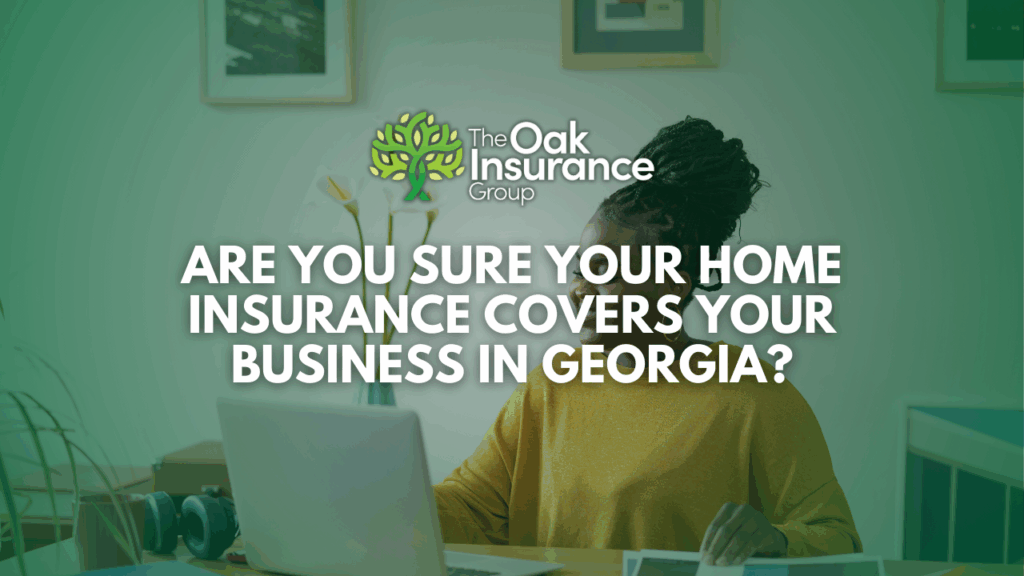
What if that assumption could cost you thousands—or even shut down your business entirely?
Many Georgia entrepreneurs running businesses from home think their homeowners insurance has them covered—but that assumption creates dangerous gaps in protection.
In this article, you’ll learn where your current policy falls short, what types of coverage you actually need, and how Georgia-specific rules add extra complexity.
Here’s what we’ll cover:
- The biggest coverage gaps hiding in your homeowners insurance
- Real-world risks by business type (service, product, food-based)
- Georgia-specific insurance laws and compliance traps
- Your best options for protecting your home-based business
- What to do next to make sure you’re fully covered
Why Homeowners Insurance Isn’t Built for Business
If you’re operating a business out of your Georgia home, your homeowners insurance policy likely won’t protect you when it matters most.
That’s because standard policies are built for personal—not commercial—use. This creates dangerous blind spots in three critical areas: business property, liability, and professional protection.
Business Property: Severely Limited
Most homeowners policies cap business property coverage at $2,500 on premises and just $250 off premises. If your business relies on computers, tools, or inventory, you’re underinsured.
Example: A Georgia-based graphic designer with $10,000 in equipment would be left covering $7,500 out-of-pocket if a fire destroyed their workspace.
Liability: You’re On Your Own
If a client trips in your home office or your work causes damage to someone else’s property, your homeowners insurance won’t cover legal fees or medical bills.
Standard policies exclude all liability tied to “business activities,” putting you at risk for lawsuits and costly claims.
Professional Mistakes: No Protection at All
Whether you’re a consultant, coach, or therapist, any mistake, missed deadline, or alleged negligence could spark a professional liability claim—and your homeowners policy won’t help.
Common Coverage Gaps by Business Type
Service-Based Businesses
Service providers (consultants, accountants, designers) face:
- Professional liability risks for mistakes or bad advice
- General liability risks if clients visit your home
- Cyber risks if you handle personal or financial data
Retail and E-Commerce
Selling products from home? You may be exposed to:
- Inventory losses beyond your coverage limit
- Product liability claims
- Cyberattacks targeting customer data
Food-Based Businesses
Georgia’s cottage food laws allow certain home food businesses—but:
- Homeowners insurance excludes food liability
- You face unique risks for foodborne illness claims and product liability
Georgia-Specific Laws You Must Know
Workers’ Compensation Rules
In Georgia, if you have three or more employees, you must carry workers’ comp—even if they’re part-time or temporary. This includes corporate officers unless they formally waive coverage.
Even if you only hire help a few times a year, you may still be legally required to carry this insurance.
Zoning and Licensing Pitfalls
To remain insured:
- You must register your business with the Georgia Department of Revenue
- Zoning laws in your area may limit what you can do from home
- Operating without proper permits can void your insurance
Better Insurance Options for Home-Based Businesses
1. Home-Based Business Endorsements
These add-ons to your homeowners policy increase business property limits and offer minimal liability coverage. However, they come with strict eligibility rules and limited protection.
- AAIS endorsements may offer up to $10,000 in property coverage
- May include minor business interruption or liability coverage
2. In-Home Business Policies
A step up from endorsements, these standalone policies offer:
- Higher coverage limits
- Broader liability protection
- Optional business interruption add-ons
Ideal for businesses with moderate risk and $5K–$25K in equipment.
3. Business Owner’s Policies (BOPs)
For more complex or higher-risk businesses, a BOP is your best bet. It bundles:
- General liability
- Commercial property
- Business interruption
In Georgia, BOPs now must include business interruption coverage and typically cost $500–$1,500 annually.
Don’t Skip These Critical Add-Ons
Cyber Liability Insurance
With rising ransomware attacks and Georgia’s strict privacy laws, cyber coverage is now a must-have.
- Covers data breaches, recovery costs, business downtime
- Essential for anyone handling customer or payment data
- Costs range from $500 to $5,000/year based on risk
Professional Liability (E&O)
If you offer services or advice, this coverage protects against:
- Negligence claims
- Mistakes or missed deadlines
- Client dissatisfaction
Premiums in Georgia typically range from $500 to $2,000/year for small service businesses.
Business Interruption Insurance
Covers lost income if your home becomes uninhabitable or operations are disrupted. All Georgia BOPs now include this by law, but coverage limits may need adjustment for high-revenue businesses.
Avoid These Common Coverage Mistakes
Failure to Disclose Business Activities
If you don’t tell your insurer you’re running a business, you risk denied claims or policy cancellation.
Operating Without Licenses
Running an unlicensed business in a non-zoned area? Your insurer can void your coverage.
Poor Documentation
Lack of records = lack of claim support. Document:
- All business-related purchases and equipment
- Inventory
- Business income and expenses
What Will It Cost to Get Fully Covered?
Think of Insurance as Investment, Not Expense
Many Georgia home-based businesses spend just 1–3% of annual revenue on insurance. That modest cost protects against:
- $20K+ lawsuits
- Cyber ransom demands
- Months of income loss
Bundle to Save
Many insurers offer discounted home + business packages. BOPs especially offer great value by bundling multiple policies.
Final Thoughts: Are You Properly Protected?
At the end of the day, many Georgia entrepreneurs unknowingly operate without proper insurance—despite the growing risks of lawsuits, data breaches, or regulatory penalties.
Now that you understand where your homeowners insurance leaves you exposed, it’s time to take action:
- Evaluate your risks based on your business type
- Disclose your business activity to your insurer
- Talk to a commercial insurance expert (not just a homeowners agent)
Protect your business. Protect your income. Protect your future.
Your next step? Get a quote from a qualified business insurance agent and close your coverage gaps today.

